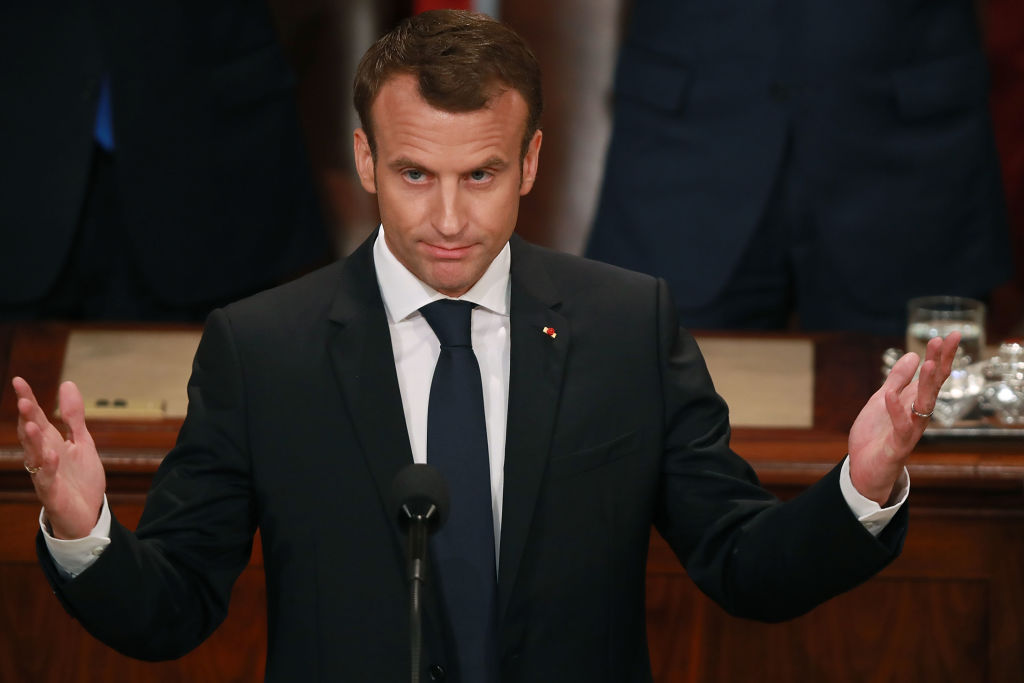While Emmanuel Macron has been wowing Washington there’s been something of a mini crisis in France. To put it bluntly, the country was invaded on Sunday, its border in the French Alps breached by a force of around 200 foreigners, who then fought with the police as they advanced on the small town of Briançon.
The incursion was organised by Italians and Swiss, their number swelled by forty migrants, a fraction of the number who in recent years have used the Alps to cross from Italy into France. In 2016, 315 were intercepted on this arduous route, a figure that last year rose to 1,900. The majority come from West Africa – Senegal, Guinea and the Ivory Coast – although there is also a Paris-based network of Pakistanis who smuggle their compatriots across the border.
One of the Italians told France24 he participated in the incursion “to express our shock at the failure of the French police to stop the fascists”. The ‘fascists’ were around 100 members of an anti-immigration organisation called Génération Identitaire who, on Saturday, had erected a symbolic frontier post on the summit of the Col de l’Echelle, six kilometres from the Italian border. Having hired two helicopters at a cost of €30,000 they unfurled a large banner on which were emblazoned the words: “No Way. Border closed. You will not make Europe Home!”.
The stunt may have been provocative but the Génération Identitaire activists broke no law, unlike the pro-migrant militants who put two policemen in hospital and escorted into France immigrants who, under the terms of the Dublin Treaty, should have applied for asylum in Italy. Nonetheless, Benoît Hamon, the Socialist candidate in last year’s presidential election, has since called for Génération Identitaire to be banned because they “provoke discrimination, hate and violence”.
The National Front disagree and one of their MPs, Louis Aliot, saluted Génération Identitaire for bringing the situation in the Alps to the country’s attention: “They’ve succeeded in making Collomb understand that there is a border,” he said. “And it must be controlled because we can’t leave the borders of France uncontrolled”.
Gérard Collomb is the Minister of the Interior, and while he condemned the actions of the anti-migrant activists he has since despatched 100 policemen to reinforce the frontier. The fact that Génération Identitaire – who have offshoots in ten other EU countries, including Britain – were also saluted by the FN’s leader, Marine Le Pen, is particularly significant. Relations between the two entities were for several years strained with Le Pen keen to distance herself from Génération Identitaire as she sought to de-demonise her party. But since her election defeat 12 months ago, Le Pen has abandoned her obsession with leaving the EU and returned to her party’s traditional pre-occupations of Islam and immigration, believing the 2022 election will be fought not on old left/right issues but on the question of national identity.
“Immigration has become the fault line in French society,” said Le Figaro on Tuesday, noting that there are more than 2,500 immigrants sleeping rough in Paris. “[It] is a symbolic marker, all the greater since it is immediately associated with migrants of Muslim origin, and the left…has always championed a positive conception of immigration.”
The same can be said of Europe in general, with pro-migrant groups like those who invaded France on Sunday convinced of their righteousness. The French writer Yann Moix, one of the organisers of a pro-migrant march from the Italian border to Calais that begins next Monday, has likened the plight of the migrants in Europe to that of Jews in World War Two; his comments came the day after Germany’s chancellor Angela Merkel admitted “we have refugees now, or people of Arab origin, who bring a different type of anti-Semitism into the country”.
In a speech to the European parliament this month, Emmanuel Macron warned of “a European civil war”. The French president didn’t name names but implied this was due to anti-migrant nationalist parties, such as the one led by Hungary’s Viktor Orbán. “There is a fascination with the illiberal, and that is growing all the time,” he told MEPs.
Orbán and his ilk argue that the greatest illiberalism was Merkel’s unilateral decision in 2015 to open the gates of Europe and her attempt to then enforce migrant quotas on the rest of the EU. It has left Europe bitterly divided and today’s warning from the United Nations that Isis commanders who have fled Syria are now conspiring with extremist groups in Africa to “foment and infiltrate a new migration wave destined for Europe” will only widen those ideological cracks. “The European community and international community has got to wake up,” David Beasley, the head of the U.N. World Food Programme told The Guardian. “If you think you had a problem resulting from a nation of 20 million people like Syria because of destabilisation and conflict resulting in migration, wait until the greater Sahel region of 500 million people is further destabilised.”
Macron also told the European parliament that he is from a generation that “has decided forcefully to defend its democracy,” a theme he returned to on Wednesday when he addressed Congress in Washington: “I do not share the fascination for new strong powers, the abandonment of freedom and the illusion of nationalism,” he said.
But pro-migrant groups in France argue that his government’s new asylum and immigration bill, ratified by parliament on Sunday, is an affront to freedom and democracy and they will challenge it at every turn.
Anti-migrant groups believe the bill doesn’t go far enough in tackling immigration and Macron and the EU must hope that the battle of Briançon isn’t a harbinger of a far greater conflict to come.







Comments